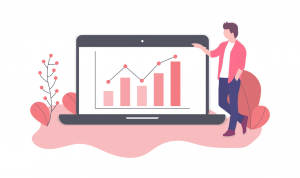
COVID is an unprecedente… Just kidding! I’m not going to start like that.
Forget the pandemic for a moment (if you can) because the CAUSE of the current market is not as important as the EFFECT it has created in the front lines of real estate. Of course, we can talk about the drop in listing volumes – stock is harder to come by. But for stock that is on the market, there is a record level of buyer demand.
Agents around the country, not to mention the portals, have recorded a significant and sustained spike in buyer enquiry over the past and present months, all while the economy is in its first legitimate recession since the 1990s. Why?
Well, the economy is a social system and so there is a lot more than money-in-money-out to the machine that is our domestic economy, and we regularly see converse relationships between the ‘numbers’ and the social experience that created them.

By way of example, pre-COVID Australia has enjoyed uninterrupted prosperity with around 25 years of economic growth, even when threatened by the Global Financial Crisis. Generations past would have hoarded for a rainy day, but during this prosperity, household-income debt ratio hit a record high. At one stage it was almost 190%, which meant that for every $100 Aussies had to spend, they were spending $190. Record debt levels are not a hard indicator of economic wellness, yet despite how well we were doing – we were going backwards, household by household, one credit card purchase at a time.
In times of high-competition and low-growth, other emotions impact how an economy functions. We spoke last week about how confidence and trust are the most sought after economic superpower in the 21st century – but there are other driving forces from the more irrational, vulnerable, and emotional parts of ourselves that converge and create economic movement, particularly in a crisis.

In this particular history that we are experiencing, the raw experience of COVID’s social isolation has arguably created a sweet spot for the spring selling market. The notion of home as a sanctuary, workplace, safe house, school yard, church house and so on heralds back to a different time when the social and economic centre of our worlds was not the metro centre, but the hearth of the home.
To more cynical days too, and I’m thinking about the 1950s in particular when one was very mindful of potential neighbourhood communists, there became an ingrained notion created that high fences made good neighbours. The idea of one’s own land plot and home, created a private almost sovereign space for individual family units to create a face for the world, and their own truths behind the closed doors.
The sheer volume of time being spent at ‘home’ in isolation during 2020 has sociological implications for the value of a home, of course it has. The incredible uptick in demand during this time from buyers looking for that ‘forever home’ – with its revised and increased value proposition changes the game as we enter into peak selling season this year. It seems we are indeed hitting ‘Spring’ in more ways than one.
I’m calling it the Covid Spring. A blossoming of the market due to a combination of unique hard and soft economic levers. Levers that can be used advantageously by an agent if you want to take up the challenge to drive opportunity this spring – rather than surrender to the depressing news cycle.
Here are the conditions of the Covid Spring that I can see:
- Government stimulus to encourage buyer confidence in the market
- Mortgage relief packages from private lenders that relieved pressure among sellers who could wait until spring to liquidate their homes – unfortunately there will always be some who lose out in a crisis.
- Banks needing to lend to the segment of purchasers who were not impacted by Covid in order to make their money.
- A scarcity of homes on the market means that buyer demand is concentrated in fewer properties. Competition creates upward pressure on prices.
- Agreeable sellers who might be spooked by the rolling news cycle are easy to please. Expectations aligned to an environment of high-anxiety headlines gives agents an opportunity to deliver in excess.
- With fewer sellers coming to market, and the aforementioned anxiety, the good agents – those who have nurtured and are nurturing relationships of trust – have the confidence of sellers and will win the listing, without needing to defend fees or drop commission.
It is a sweet spot that is ripe for a good selling season.


